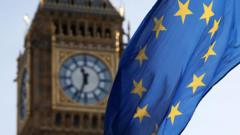As the UK and EU prepare for their inaugural bilateral summit since Brexit, the focus is on fostering closer ties amidst global challenges. Key discussions will include trade, security, and economic cooperation, as both sides navigate lingering tensions while acknowledging the necessity of collaboration.**
UK and EU Seek Common Ground Ahead of Historic Summit Post-Brexit**

UK and EU Seek Common Ground Ahead of Historic Summit Post-Brexit**
The first UK-EU summit since Brexit aims to address pressing geopolitical concerns amid shifting international dynamics.**
As the UK and the EU gear up for their first bilateral summit in London since Brexit, anticipation is building around the potential for renewed cooperation. Scheduled for Monday, this meeting symbolizes a pivotal moment for both parties amid a landscape burdened by global crises such as tensions with Russia and China, and the ongoing war in Ukraine. Observers note that while past bitterness remains in the background, the urgency of current global challenges necessitates a pragmatic approach to collaboration.
In the face of evolving security threats, leaders on both sides acknowledge the importance of strengthening ties. Anand Menon, director of the think tank UK in a Changing Europe, pointed out, "Failure to do so, in the current international context, would not be a good look." This sentiment reflects a broader consensus among European leaders, including even traditionally resistant countries like France, which has maintained a tough stance during pre-summit negotiations.
In a notable diplomatic gesture, the UK has extended an invitation for French President Emmanuel Macron to make his first state visit to Britain, hosted by King Charles and Queen Camilla at Windsor Castle. These developments underscore an apparent intent to smooth relations and foster goodwill ahead of crucial discussions.
As the summit unfolds, three key announcements are anticipated: a joint declaration addressing shared foreign policy priorities, an EU-UK security and defense pact, and measures aimed at reducing post-Brexit trade barriers. While UK Prime Minister Sir Keir Starmer has promised a "reset" with the EU, the proposed trade measures appear modest, constrained by the Labour government's commitment to avoiding re-entry into the EU's customs union or single market.
With the EU accounting for a significant portion of UK exports, the British government recognizes the value of closer trade relationships. Negotiations over a plant and animal health agreement—a crucial step in streamlining trade practices—are ongoing, albeit fraught with stipulations that could alienate fervent Brexit supporters.
The talks will also encompass discussions around military cooperation, with the UK advocating for its defense companies to have access to EU procurement contracts under a new initiative called SAFE (Security Action for Europe). The outcome is expected to be complex, as France has been resistant to allowing non-EU companies to bid for contracts, emphasizing the need for EU self-reliance in defense spending.
Amid skeptical reactions from some quarters, particularly regarding defense and economic negotiations, the summit serves as an opportunity for both sides to navigate the delicate balance of competing national interests while acknowledging the shared challenges ahead. Ultimately, whether this meeting leads to meaningful advancements in UK-EU relations remains to be seen, but both parties appear at least willing to explore avenues for collaboration in an increasingly uncertain world.




















